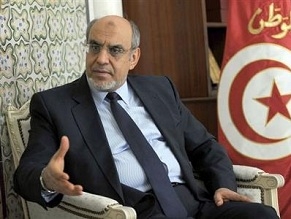|
World Jewish News

Tunisian Prime Minister Hamadi Jebali resigned on Tuesday after his ruling Ennahda party failed to support his plans to dissolve the politically unstable governing coalition and replace them with a new government of technocrats.
|
Ashton pays tribute to outgoing Tunisian PM as he confirms resignation and concedes government must ‘regain peoples’ trust’
21.02.2013, Israel and the World EU foreign policy chief revealed her “profound respect” for outgoing Tunisian Premier Hamadi Jebali following his resignation on Tuesday, after his ruling Ennahda party failed to support his plans to dissolve the politically unstable governing coalition and replace them with a new government of technocrats.
Revealing his decision to step down, having spearheaded the first democrat administration to govern the country since the fall of former autocratic leader Ben Ali in January 2011, which sparked the popular Arab uprisings across the region, he said the forced move amidst a fractious political and social landscape sparked “great disappointment among the people and we must regain their trust and this resignation is a first step”.
The country’s problems were further compounded as an international ratings agency downgraded the government’s credit rating, midst fears that political tensions would further impede its ability to emerge from sluggish trading caused by its reliance on exports to its financially-burdened European allies.
The current instability was prompted by the assassination of opposition leader Choukri Belaid earlier this month which prompted widespread riots and continued delays in drafting the country’s new constitution, which led Jebali to suggest either forming and heading a new government or resigning his post. Whilst his initiative was accepted by opposition groups, it was roundly rejected by his own Islamist party which favoured establishing a mixed coalition of politicians and technocrats.
Recalling political players to their commitment to ongoing democratic transition, Ashton reiterated the need for a “sincere dialogue between all political and social actors in civil society with a shared commitment to secure a democratic Tunisia”.
Following the assassination of secular Belaid, a fierce critic of the Islamist administration, violence erupted near the cemetery where he was buried as the 50,000-strong crowd of mourners called for a new revolution, in evidence of rising tensions between the old secular guard and Muslim leaderships that have risen to power across the Arab World in the wake of the popular uprisings of two years ago.
Anti-Islamist feeling has increasingly mounted in Tunisia amid fears the government made little effort to counter a series of attacks by radical Salafists on cultural centres including cinemas, theatres and bars in recent months.
The modest 2,000-storng Jewish community has also suffered knock-on effects from rising tensions with some 80 gravestones reported as having been desecrated in Tunisia’s Jewish cemeteries in two separate incidents in the past month alone.
Outgoing Premier Jebali condemned the attacks on a cemetery in the city of Sousse, which the Israeli foreign ministry has linked to hostile anti-Israel atmosphere in the country, as Tunisian President Moncef Marzouki last month committed to making a visit to his Hamas allies in the Gaza Strip in February, which would make him the fourth Muslim leader to travel to the Strip in as many months.
Gideon Behar, head of the Israel foreign ministry’s Department for Combating Anti-Semitism noted an apparent “increase in anti-Semitic statements among local clerics and cases of public incitement against Jews” in the North African country which at the declaration of Tunisian independence in 1956 was home to an indigenous Jewish population of 100,000. Its current low of 1,000 remains the largest religious minority in the country.
The Foreign Ministry instructed Israel's embassies in the United States, France, Britain, Germany and Italy earlier this week to ask the countries' foreign ministries to relay Israel's demand that the Tunisian government must guarantee the Jewish community's safety.
Israeli representatives were also instructed to ask the international community to publicly condemn the desecration of Jewish cemeteries, with Israeli likely to call on Ashton to utilise her influence with the Tunisian administration to ensure the security of the Jewish community and curb the climate anti-Jewish and anti-Israel incitement.
by: Shari Ryness
EJP
|
|
